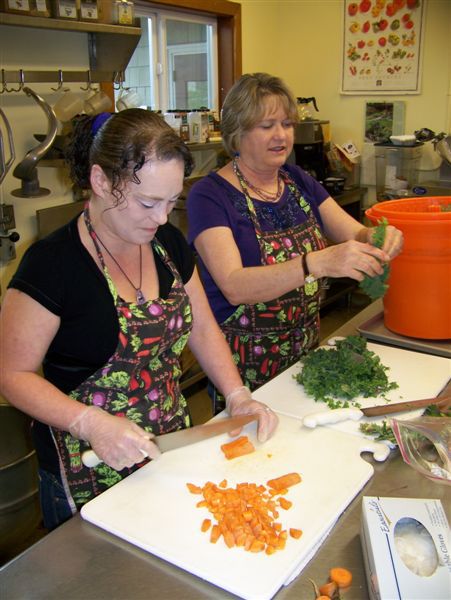By Cali Bagby
If you walk into Lopez School during lunch, you may be surprised to smell fresh baked bread and teenagers loading plates with salad made with ingredients straight out of the garden.
In the kitchen you’ll find Dana Cotten and Samantha Taylor preparing food that resembles the menus of posh restaurants popping up all across the U.S. And what are these ingredients the cafeteria and those dining establishments share? Fresh, local and organic food. But instead of men in suits and women in heels, there are K- 12 school kids happily munching on dishes like kale salad.
“The kids get excited about their food and what they eat, it really blows me away,” Taylor said.
It all started eight years ago when kids at Lopez School decided they wanted local beef and started fundraising for fresh and organic food. Over the years, donations have funded local grains, vegetables and meat. But those funds are running out and now Cotten, kitchen manager and head cook at Lopez School, and Taylor, who shares the title of head cook, are hosting a fundraiser of their own – an Italian Dinner and silent auction, Saturday, April 21. The dinner features spaghetti sauce straight from the school’s garden tomatoes, beef from the Jones Family Farm, bread made from Lopez Wheat and chocolate pumpkin cake. The auction will feature items like smoked salmon, massages, palm readings, gift certificates and more.
The funds will go to the cafeteria for the next school year.
“Our goal is to keep the program sustainable,” Cotten said. “And we don’t want the ‘pink slime’ the government offers.”
“Pink slime” is a food additive that may be added to ground beef and beef-based processed meats as a filler. It consists of finely ground beef scraps and connective tissue that have been removed from the fat.
Taylor said every year they have set goals like cutting out high-fructose sugar, not serving government beef, using butter instead of margarine and using healthier cooking oils. They also strive to use food free of genetically modified organisms.
“And a lot of love goes into the food,” Cotten said.
The Lopez School cafeteria offers two large carts for a salad bar, and their main courses are almost 100 percent homemade. They also offer vegetarian options. The cooks use vegetables from the school’s two greenhouses and garden beds, and preserve foods throughout the year.
“For a lot of kids, this may be the only meal with good nutrition,” Taylor said.
And it’s not just the kids that are learning healthy eating habits from the fresh food. When the program first switched to meals made from scratch, Taylor begged Cotten to keep the processed nacho cheese dip.
Now she not only cooks homemade food for the students, but for her family as well. She has had to learn not only to cook fresh food, but to make it taste good. But she said it has been worth it, especially when she sees that kids prefer her homemade oatmeal to sugary cereals in the morning.
“I love going to work, it’s my inspiration, it’s something I’ll do for the rest of my life,” Taylor said.
School cafeterias around the country are moving toward organic food service.
When Cotten recently attended a Fresh Food in School Summit in Olympia, put on by the Washington State Department of Agriculture, she discovered that Lopez School is a leader when it comes to fresh food. And at the upcoming summit in May, Lopez School Superintendent Bill Evans will be a keynote speaker.
“This is our dream to make this happen,” Taylor said. “Community involvement helps us go forward, having good food and not ‘pink slime.’”
The dinner is $10, $5 for elementary students and ages two and under are free.





